Note: This post may contain affiliate links which means if you click on a link and purchase an item, we will receive an affiliate commission at no extra cost to you.
This is the latest interview in a series featuring digital nomads talking about their lives and lessons (click here if you want to be interviewed). The goal is to help demystify the process of making money online, wandering the world, and living an unconventional life!
We love Brett’s story of learning Mandarin, living, and teaching in China.
Thanks for hanging out with us, Brett!
Table of Contents
Introduce yourself! 🙂 Who are you? What do you do for work? And what is your nomadic story?
I was born in and grew up in the UK. I majored in biochemistry, then discovered the internet and accidentally became a website developer. I always think it’s neat that the job I ended up doing after university didn’t actually exist when I started my course!
I’ve spent a total of 3.5 years living abroad as both a digital nomad and an English teacher. My first spell of digital nomading was during a year-long career break where I lived in South East Asia for a while. Although I had a good job with a decent salary, I felt that life was passing me by. Sitting in front of a computer for 8 hours a day wasn’t doing my health any favours either.
Originally I chose to study Mandarin Chinese at a university in Guangzhou, Southern China. I’d visited Guangzhou a few years before. China at that time was a crazy place to live and a travel blogger’s dream. I had an incredible time living there, but l damn near went crazy living in 36°C heat and 100% humidity with a broken air conditioning unit. I’d always wanted to visit Thailand, so I booked a two-week vacation to Bangkok. It was just so much easier to live there compared to Southern China, so I ended up living in a Bangkok studio apartment for six months.
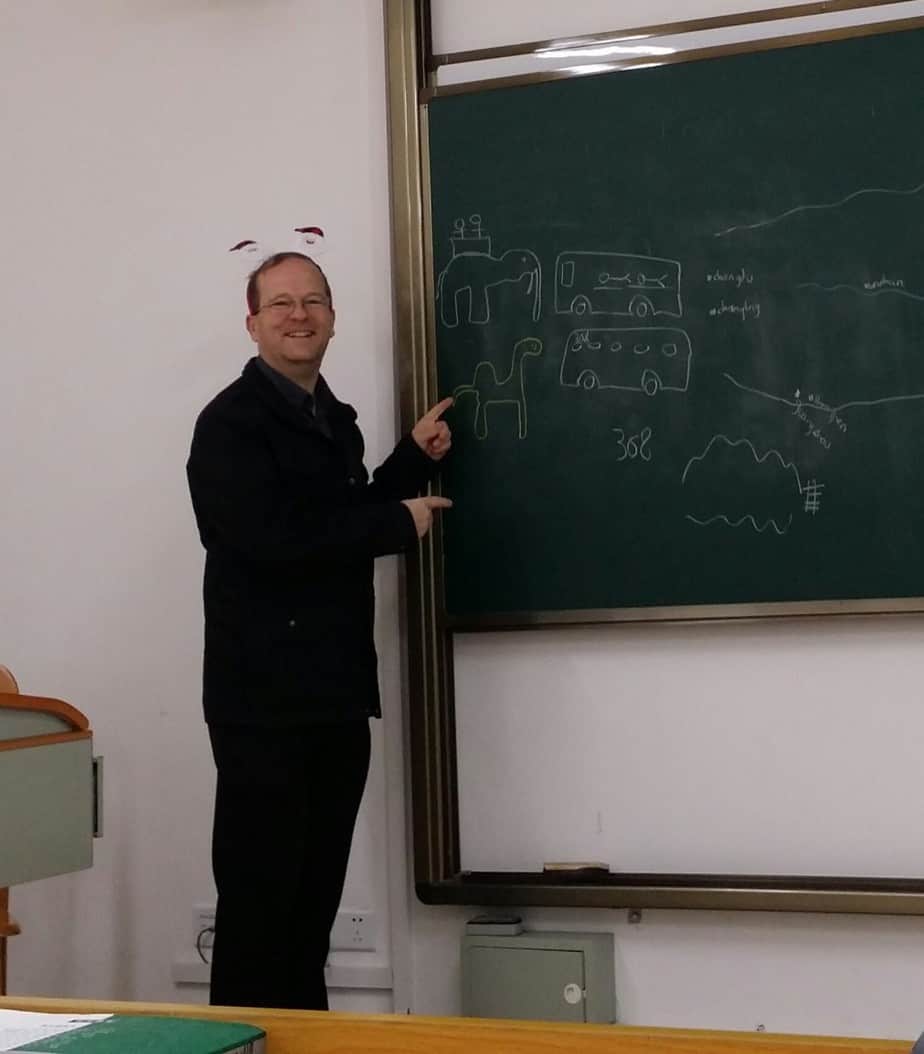
Incidentally, I was on education visas in both China and Thailand. They were a good option if you want to live legally in one place for a long time, but they’ve become a lot more difficult to obtain. China education visas have a more complex (and expensive!) application process now, while Thai educational visas are many times more difficult to obtain.
The following year I returned to corporate life but failed to settle. I knew that if I wanted to live overseas again, the best route was to become an English teacher. Digital nomading is a potentially good lifestyle, but it is much easier to live overseas when you have a legitimate work visa. My first step was to enroll in a 120 hour TEFL course with the TEFL Academy. At the initial weekend training session, I loved the lesson planning, but doing my very first teaching practice on stage in front of 40 people was terrifying!
Undaunted, I decided to take the plunge and enrolled on a part-time CELTA course in Barcelona, Spain. Living in Barcelona was fantastic due to the low cost of living, great food, and almost continuous blue skies. Spain is arguably the best place to start an English teaching career, although International House, where I studied, was a victim of the Covid pandemic and has since closed down. The course was really tough (even on a part-time basis), but I found it brilliant preparation for my first teaching role in China.
What inspired you to start nomading? And how has nomading changed your perspective on life?
I did have a vague bucket list goal of wanting to work in another country. But I guess going abroad was as much about thinking the grass was greener and worrying about the terminal decline of the Western culture I grew up with. I’m friends with Winston Wu, a sometimes controversial and outspoken figure. His Happier Abroad website and ad-hoc movement has definitely had an impact on my life. I still don’t know if I’m personally “happier abroad,” but it’s such a brilliant concept.
I would say that the life experiences gained from nomading have vastly enriched my life. I have so many amazing memories, like riding pillion on my friend’s vastly overpowered electric bicycle in Guangzhou and eating Tom Yum soup at a little shack beside the railway in central Bangkok. The drawback is that I have found that most hiring managers back in my native country are completely dismissive of the skills I have gained from working on my own projects and teaching English overseas. TEFL teachers, in particular, are completely unvalued and looked down upon in the UK, whereas being a teacher in Asia is considered a prestigious job.
What are the 2-3 favorite places where you’ve lived/traveled to and why?
I was lucky enough to visit a few different European countries with my parents during family vacations. However, it wasn’t until my mid-30s that I actually considered traveling overseas on my own. My first trip was in 2005, and I went to New York. Wheeling my suitcase out of Penn Station and seeing skyscrapers, hot dog carts, and yellow taxis was such an overwhelming experience. Even the post-Katrina rainstorms didn’t dampen my love of the Big Apple. I was only there for ten days, but it was a life-changing trip. I remember sitting in Newark airport eating a terrible pizza and reassuring myself that I would return sometime.
I never did return to New York. My attention soon turned to the glistening new cities in Asia. I visited Hong Kong in 2006, largely as a dry run for visiting the #1 place I wanted to visit – Japan!
I made it to Tokyo in 2007. Arriving at Narita airport was unlike anywhere else I’d ever experienced. One of the customs officers opened my case and pointed to a card asking me if I had any Playboy magazines or snakes (!) in my suitcase.
I boarded the Narita Express and marveled at the LED display that would track our train journey to downtown Tokyo. I vividly remember the train leaving the airport station and traveling past rice paddy fields and the odd isolated hamlet. Soon it was thundering past the endless suburbs, but when we reached the central areas, I was in total awe as the elevated tracks skirted around skyscrapers and packed bullet trains snaked past us. Arriving at the peak of the evening rush hour was absolutely insane.
China was arguably at its peak for Western travelers in 2009 – 2012. I lived in Guangzhou in 2013. Guangzhou is sometimes referred to as Hong Kong’s evil twin sister. It was an incredibly crazy and vibrant place when I lived there.
In 2019 I returned to Guangzhou, this time to work. Never go back is such a terrible cliché – but it’s true! In 6 years, the place had changed beyond all recognition. All the hawkers and street cooking stalls had vanished, the old neighborhood I had so many good memories of had been completely razed to the ground, and my old apartment building was a pile of rubble.
What advice would you give to someone who’s thinking about nomading?
I remember the date – 11 September 2013. I was living in Bangkok, Thailand, and went to meet my friend at the Bamboo Lebanese restaurant in Nana. While we were there, a thunderstorm broke and lashed the streets with torrential rain. There was nothing unusual about that – it was the rainy season, and I had brought my pocket-sized umbrella (more of a defense against aggressive street dogs than anything that could protect against monsoon rain).
We ate, the rain stopped, and I hopped on one of the iconic “battle tank” red buses back to my condo in Ekkamai.
By the time the bus had passed Sukhumvit’s Phrom Phong station, another thunderstorm started pelting the streets again. This was highly unusual. When we reached Ekkamai, I hopped off by the 7-11 and decided to shelter there a little and let the storm pass.
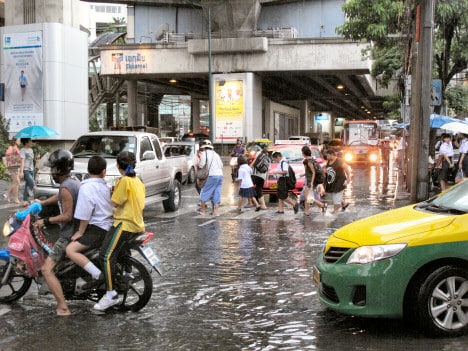
It didn’t pass. I waited there for at least an hour. There was so much water flowing along Sukhumvit that it seeped over the curb, and roaches and rats fled the sewers in search of higher ground. At one point, a Western guy walked past me, laughed, and quoted that famous US military phrase “embrace the suck.” When you go to live in somebody else’s country, this is the best way to get through the inevitable crises. I took a deep breath, moved my wallet and passport to my shirt pocket, and waded through two feet of rainwater that had flooded the back road to my condo.
So when you go overseas, and something bad happens – embrace the suck!
What is one of your favorite travel stories/experiences?
In February 2013, I was living in a rundown hotel opposite the Guangzhou university where I was studying Mandarin Chinese.
I was in the bathroom when suddenly, the glass shower screen next to me started rattling. I thought it was just a truck passing by the road in front of the hotel, but the shaking intensified. I realized that I was experiencing an earthquake and a pretty significant one too. Horrified at the thought of dying on the toilet, I remembered the advice I saw in a Japanese hotel I once stayed in and stood in the bathroom doorway, hoping that the building wouldn’t turn to rubble like those buildings that were always shown in earthquake reports on TV.
I subsequently found out the earthquake was of 4.5 magnitude, and the epicenter was 100 miles away. That gave me an appreciation of just how large Japan’s 2011 magnitude 9.0 earthquake that caused the tsunami was (I missed experiencing that one by just 99 days).
Please tell us your detailed story of how you got into your line of work and how you turned it into a remote career.
If you want to teach English in most countries, you generally need a bachelor’s degree (major isn’t important) and a 120-hour TEFL certificate. It also helps that you’re a native English speaker. Though you can do TEFL certificates online, I would highly recommend the CELTA or Trinity CertTESOL because the actual teaching practice you get as part of the course really gives you the confidence you need to go to a foreign country and start teaching without much supervision.
What does a day in your work life look like? Paint a picture for us :).
When I’m digital nomading, I almost only ever work on my own projects. I did try doing some gigs on UpWork, but I found the clients really picky, and it wasn’t for me.
When working on my own projects, I usually make a list of two things I want to achieve each day. However, I am very likely to get sidetracked, and I will very often start a little project on a whim. As a small business owner, the huge advantage is that if an opportunity arises, I can roll out a new feature on my website before larger competitors have even scheduled their meeting to talk about their equivalent new feature!
I’ll also say that although I do get sidetracked, I’m usually doing something productive. I rarely read blogs and lost interest in social media years ago.
For those interested in TEFL, I’ll talk about what my usual day was while working in China, plus a little bit about my contract.
I worked for two different universities in China. I was contracted on an annual basis from September to the end of June. My salary was around $1500 a month, and I got a free apartment (although in one role, I had to pay utility bills).
Universities have two semesters a year. I was paid a full salary over the Chinese New Year between semesters (between 4-6 weeks, depending on the lunar calendar). If you decide to stay in a specific job, then you’ll maybe get a retainer over the summer (usually half salary). What you do on holidays is up to you, but I continued working on my coding side projects on those days.
During the semester, I taught between 16 and 22 hours a week. Although it’s on an hourly basis, lessons are actually two 45 minute segments with a ten-minute comfort break in between.
Lessons started at 08:00, and yes – I had a lot of early starts! The good news is that my free accommodation was situated on the campus, so I only had a 10-minute walk to the classroom.
Language teaching in China has changed a lot in the last decade. The first generations of foreign English teachers were just there to get the students engaged in conversation. You needed minimal technical knowledge and, in many cases, didn’t need any qualifications. By contrast, I found that on a typical day, I might be teaching oral English, reading, and academic writing. In my second role, I taught Masters and Ph.D. students at one of China’s leading research universities, so having an appreciation of technical language was extremely useful.
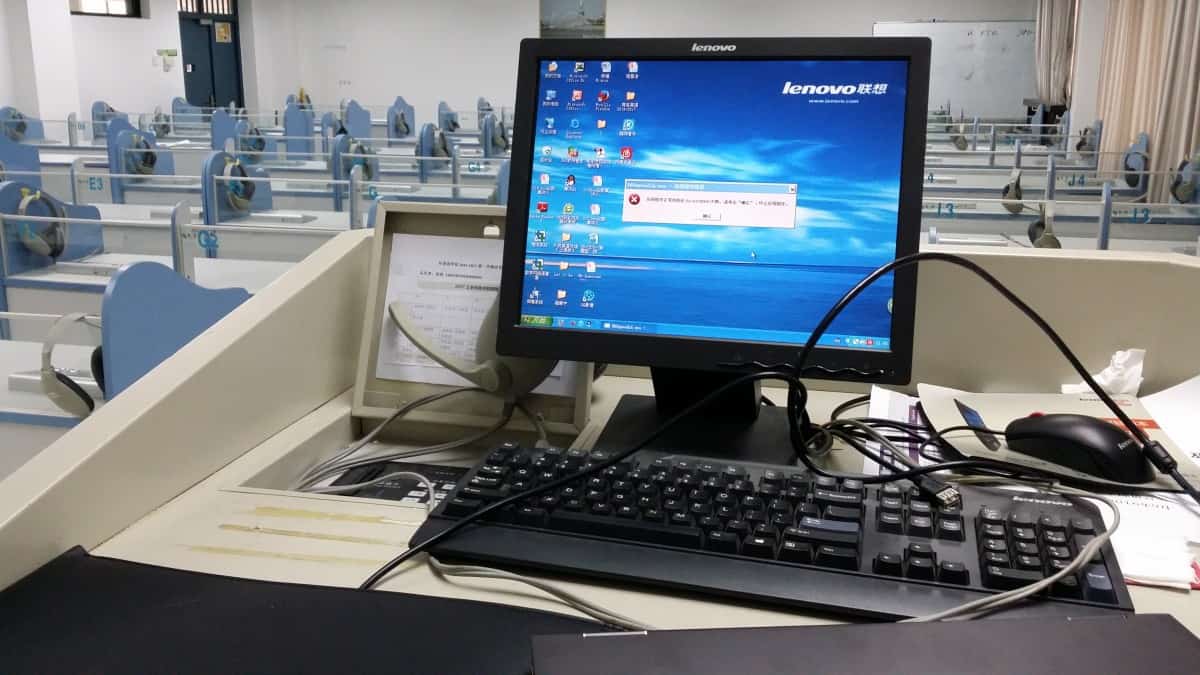
A typical Chinese foreign language classroom (and yes, Windows is all in Chinese!).
Lessons in China are generally very teacher-focused, although the CELTA will impress on you the importance of group working and discussion in language teaching.
Between lessons, I had a lot of lesson planning to do. If you teach in a university, you’re usually expected to plan your own lessons. Some courses had textbooks, but these ranged from bad to terrible! Some were excellent, though (especially those published in the West), so basically, the only planning required is to make sure you have the .mp3 listening files to accompany the textbook.
Once you’ve done a year, then you will find the subsequent years easier as you’ll have a rich library of lesson plans you can reuse.
My class sizes were large – from 20 to 50 (!) students. For writing classes, this meant I had a lot of marking to do, and in one university, there was the additional pressure of having to plan, write, and then mark end-of-semester exam papers.
Sometimes I would eat in the school canteen. It was subsidized, and a meal cost the equivalent of $0.38! I wasn’t keen on going there, though, mostly because they rarely cooked anything I wanted to eat. Instead, I used to cook on a hotplate in my apartment. I tended to buy most of my provisions from foreign supermarkets like Carrefour and Walmart.
Chinese school canteen lunch of fried tofu, spicy potatoes, rice, and aquarium fish.
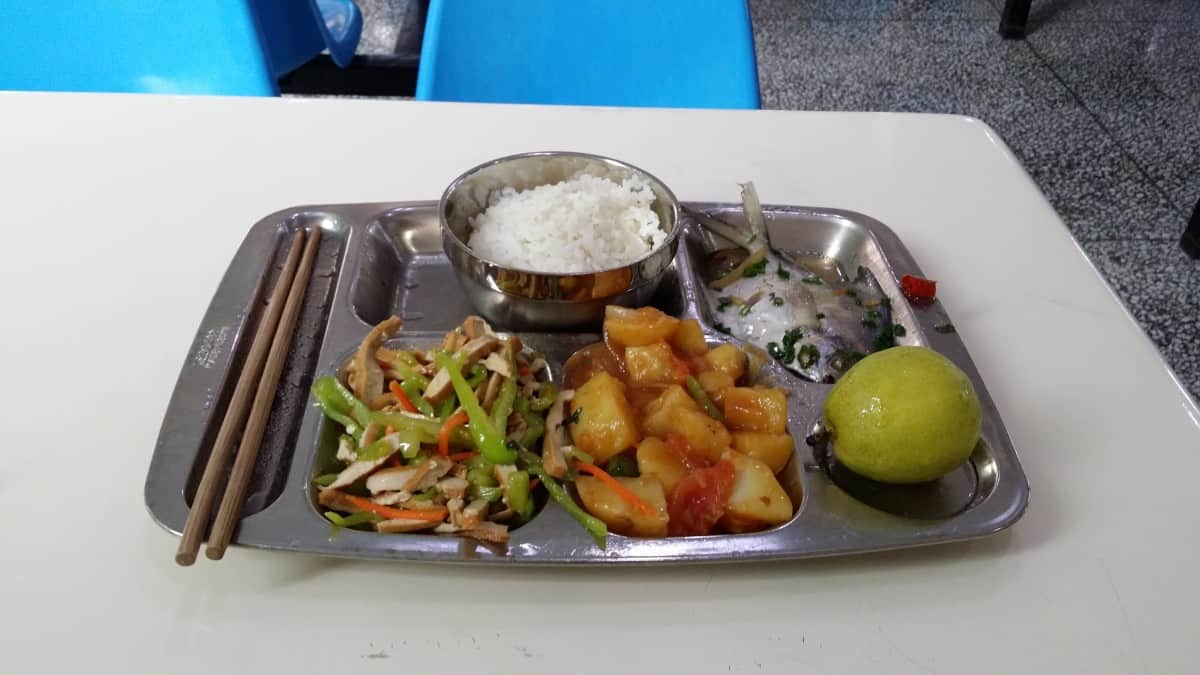
Chinese School canteen lunch of rice tofu and aquarium fish
Lessons ended at 17:15. I would sometimes go downtown or wander around the campus in the evenings, seeing if anything was happening. Chinese students are famous for spending long hours studying. I did get invited to judge a few competitions through which helped develop my own self-confidence. Overall, though, my social life in China wasn’t that good, and it was quite a lonely existence.
What digital tools do you use for your work?
For building my websites, I use Microsoft’s Visual Studio. It’s largely free these days as Microsoft now makes their big money from hosting apps on their Azure hosting plans. As a thrifty digital nomad, I host my sites on a cheap Interserver shared hosting plan, which only costs a few dollars a month.
I code my websites using .NET Core, C#, and MySQL. I tend to make extensive use of free coding frameworks such as Bootstrap.
I’m quite traditional and hate trying new things. One tool I discovered while working for a client through UpWork is Trello. I still use it to keep track of all my ideas and project TODO lists. It’s an absolutely brilliant tool.
For someone interested in getting into your field of work, what’s the best advice that you would give? And what books, podcasts, thought leaders, or other learning resources do you recommend?
I am entirely self-taught in programming. I first learnt how to code in the 1980s when my parents bought a home computer one Christmas.
In my final year at university, the World Wide Web came along, and I learnt some HTML so I could make a simple website. After that, I bought JavaScript for Dummies and tried adding some interactive features to my website. I found JavaScript brutally tough at first and was actually in tears at one point. Perseverance is the #1 quality you need to be a coder!
I really improved my coding skills by blagging my way into a job working for one of London’s leading design agencies during the dot com boom of 1999 – 2001. The first project I worked on was a behemoth of a recruitment website with over 1000 interactive web pages and about 1000 database stored procedures. It was an incredibly steep learning curve, but that’s how I got started.
Unless the economy is on fire, it’s quite difficult to get into coding like that. Fortunately, there are now plenty of alternatives. Having a side project is a great way to get started – just dream up a small project, then code it. If you get stuck on a problem, there are loads of great websites to help you out. One resource I couldn’t do without is Stackoverflow.
Tell us about your content creation journey, and share some of your favorite content that people should check out!
I’ve been a content creator since 1998. I made my first few dollars online after seeing a programming website that had a “write for us” link at the bottom of the page.
The site I used to write for is long since gone to the digital graveyard. However, the other day I was browsing the Wayback Machine, and I found they had indexed the site. Here’s a screenshot of one of the first articles I wrote for them:
Writing for them was beer money compared to a little side project I started in 2002. In my previous job, we had a coding tool that was used to help us work on big projects. I decided to make my own version of this tool. It started off being free, but then I realised I could put a “buy now” button on my site and make some money!
That business ultimately went on to make me around $100,000. I made a second digital fortune during the blogging boom of 2009 – 2012. While I’ve let many of my domain names expire, I still derive some useful additional income from 3-4 of the niche blogs I started during that time. They’re mostly monetized using affiliate CPA offers.
Between 2012 and 2017, I mostly worked on ideas that failed to take off. The internet became a lot more competitive during this time. Good ideas weren’t the goldmine they were in the earlier internet age because they’ve (1) often been done before or (2) they just won’t take off without some serious marketing or growth hacking.
I’ve largely given up blogging now. I started what I thought was a brilliant TEFL blog in 2017, but I got virtually no visitors. So I’ve returned to my coding roots, and I now build interactive websites I think people will find useful.
What do you travel with that you couldn’t imagine traveling without?
When I worked in China, I took just one 23Kg suitcase with me. I tend to buy most things I need when I get to my destination. However, I have found that health-related paraphernalia is often difficult to obtain overseas, and I tend to bring it all with me. For example, vitamins and mineral supplements are crazily expensive in Asia.
What small change has made a big difference in your life?
I used to be a big worrier. Living in Thailand knocked the worst of that out of me. So many of the people I met there lived day to day that they did not have time to think about what might or might not happen in the future.
It has been my experience that people who worry tend to worry about completely the wrong things. When I took up my teaching job in Guangzhou in October 2019, I was paranoid about catching Dengue fever from the numerous mosquitos that somehow found their way into my apartment. Little did I know that while I was busy mosquito-proofing my apartment, something circulating in Wuhan would have arguably the biggest impact in my life to date.
Tell us about a deep passion of yours! What has your journey been like, and what advice/resources would you recommend for someone interested in learning more about this topic?
Like many coders, I have autism and have always had special interests. Last year I got into BJD (ball-jointed dolls). Initially, I wanted one because I’ve always loved Japanese anime and collectibles, and BJD are a great fusion of both hobbies.
BJD themselves have been one of the winners of the Covid lockdowns. I guess because it’s one hobby you can do while not leaving the house, but also perhaps emotional support dolls are in great demand.
I love that the dolls are so photogenic and have rekindled my interest in using my digital SLR camera. Also, they are highly collectible, and the dolls plus their accessories hold their value – useful in an era where the value of currencies is being eroded on a daily basis.
I have a small blog and YouTube channel about BJD at kawaiidolls.tv. A tip if you’re into arts and crafts: clothes and accessories made for BJD are excellent Etsy ventures, and that’s something you can do from any country in the world that has a postal service.
If you’re passionate about FIRE (Financial Independence Early Retirement), please share how this has impacted your life, what your journey has been like, and what other people should know about FIRE!
I was into FIRE before it became a thing. I was largely inspired by my uncle telling me about his friend who owned several properties yet had a modest job as a cruise ship steward. My uncle said his friend would never spend money if he didn’t have to. For example, he’d never take a taxi – he’d walk to his destination. That has pretty much been my ethos throughout my life.
I think being good with money also has a genetic or personality element. People seem to be either good or rubbish with money, with little in between. My mom was an accountant, so I definitely inherited those genes. Below is my net worth chart since I began recording it in 2000 (assets minus debts). I’ve omitted the Y-Axis because it’s the trend that is important here rather than the actual figures.
The big fall into negative net worth in 2006 was when I bought a rental property (since sold). I guess the message from this chart is that if you have a regular job and are careful with your money, then you can build some serious wealth over time. You’ll also notice that what I considered major crises at the time (redundancy/being fired) were just tiny blips along the journey of life. Well, apart from Covid – you can see from this chart why I say it has been the biggest crisis of my life!
How can people learn more about you and your work?
I’m not a huge social media user, but I tweet on my @NicheLaboratory account. You definitely want to follow me if you’re a blogger or want SEO tips. I am a professional coder, so if you have an idea for a project, then let’s collaborate!
I have a large number of side projects. One that readers of this site might find useful is FindAChannel.Net. It’s a directory of YouTube channels. Sure, if you want to find channels, you can just search YouTube. However, my site allows you to search by channel size, subscriber count, and it’s perfect for uncovering rising stars. It also estimates how much (or little!) channels make on a monthly basis.
I also have a blog directory at FindABlog.Net. If you’re a travel blogger, then you’ll definitely want to check out my attempt at building a Travel Blog Explorer. By the time you read this, I might also have bolted on the functionality that will allow you to create an account and make lists of the blogs you want to post comments on or guest write for.


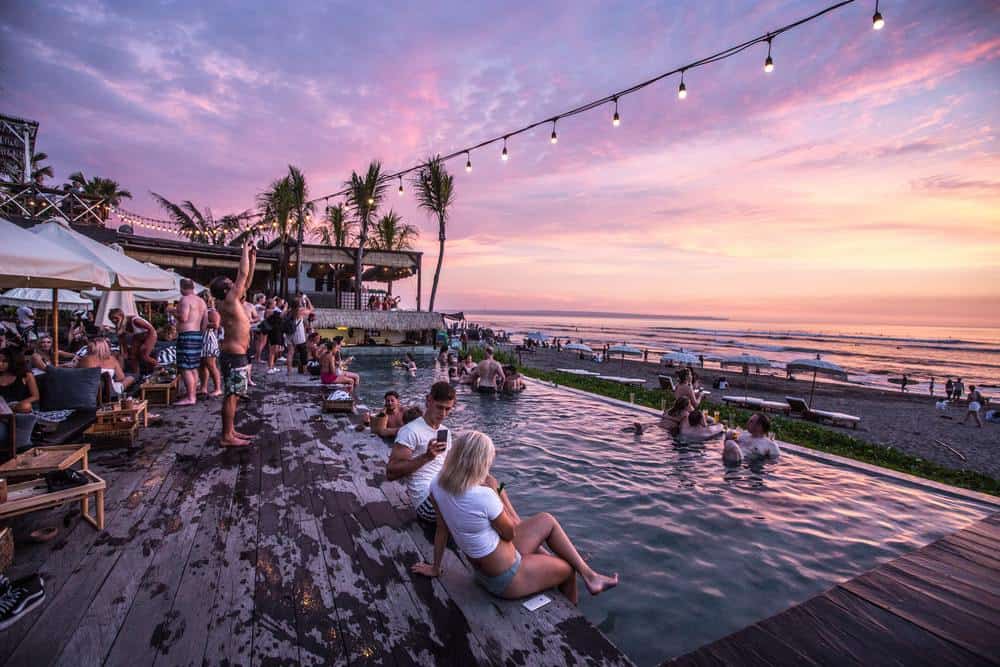
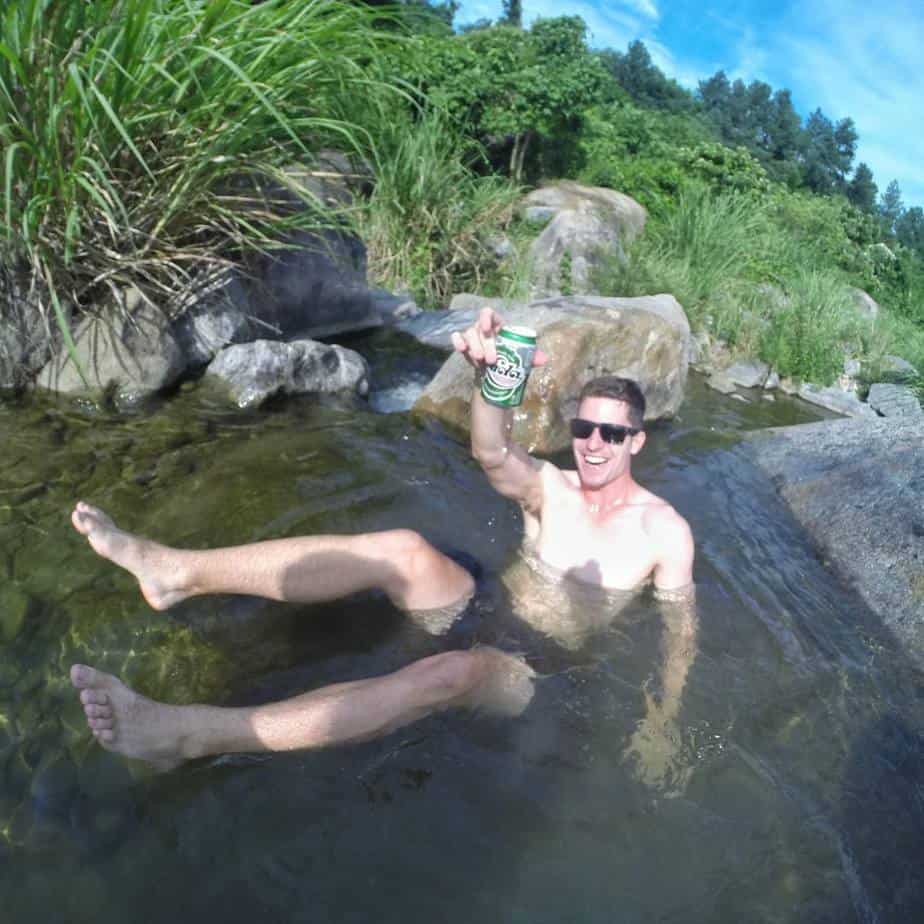
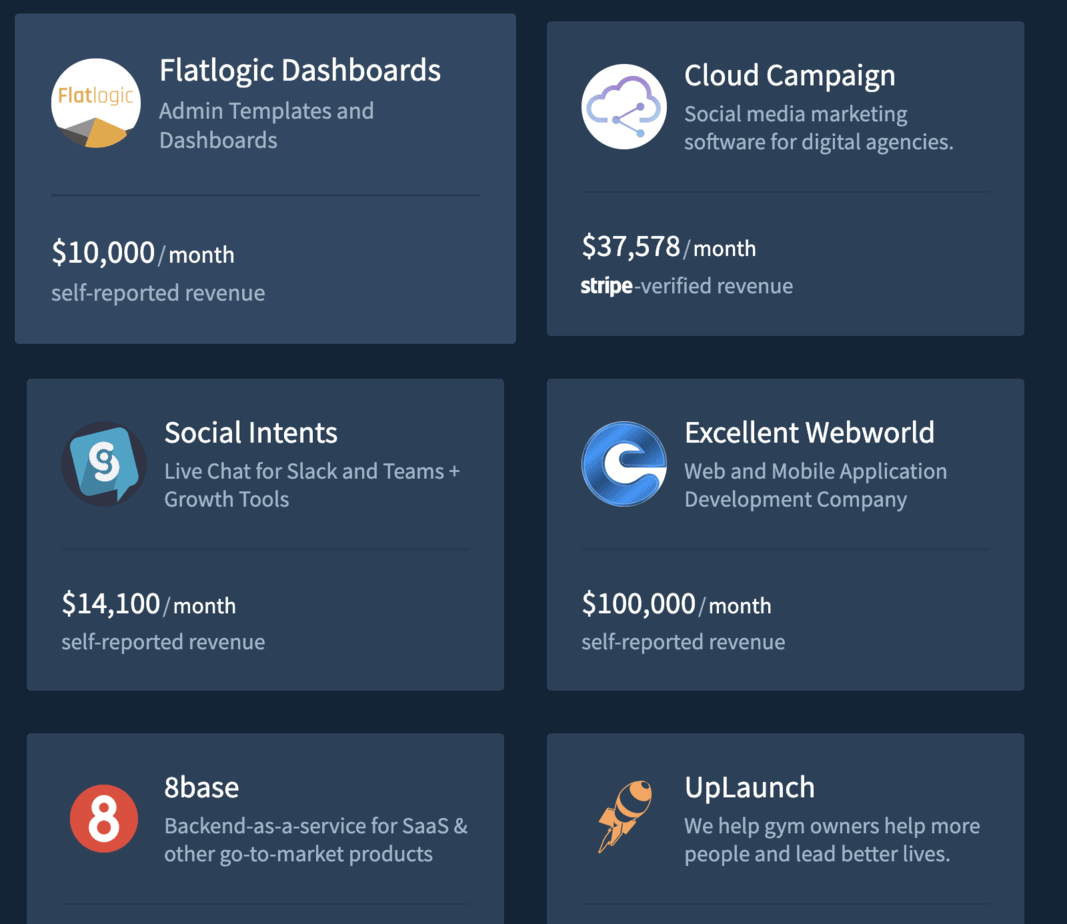
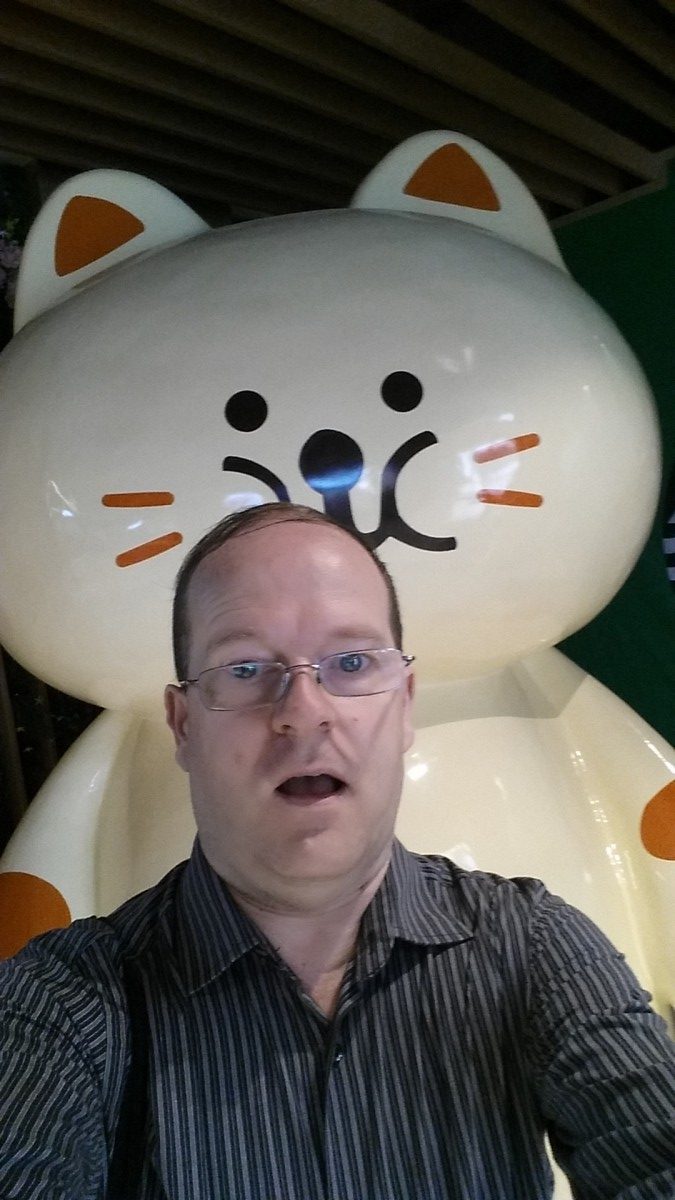
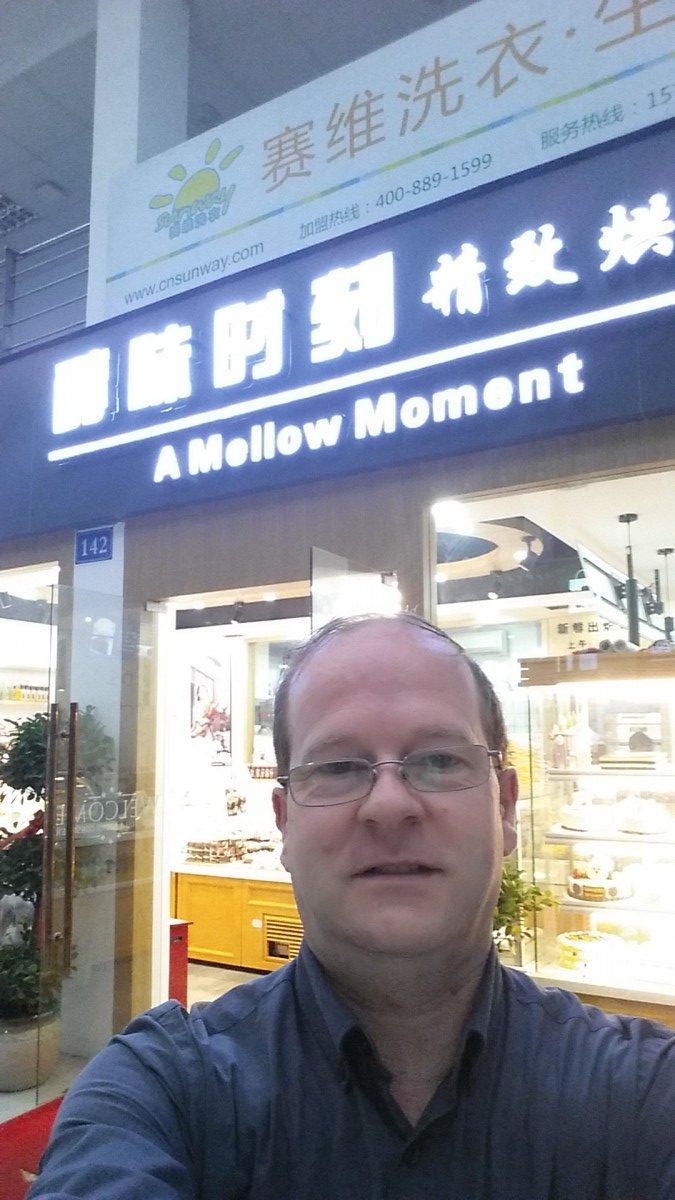
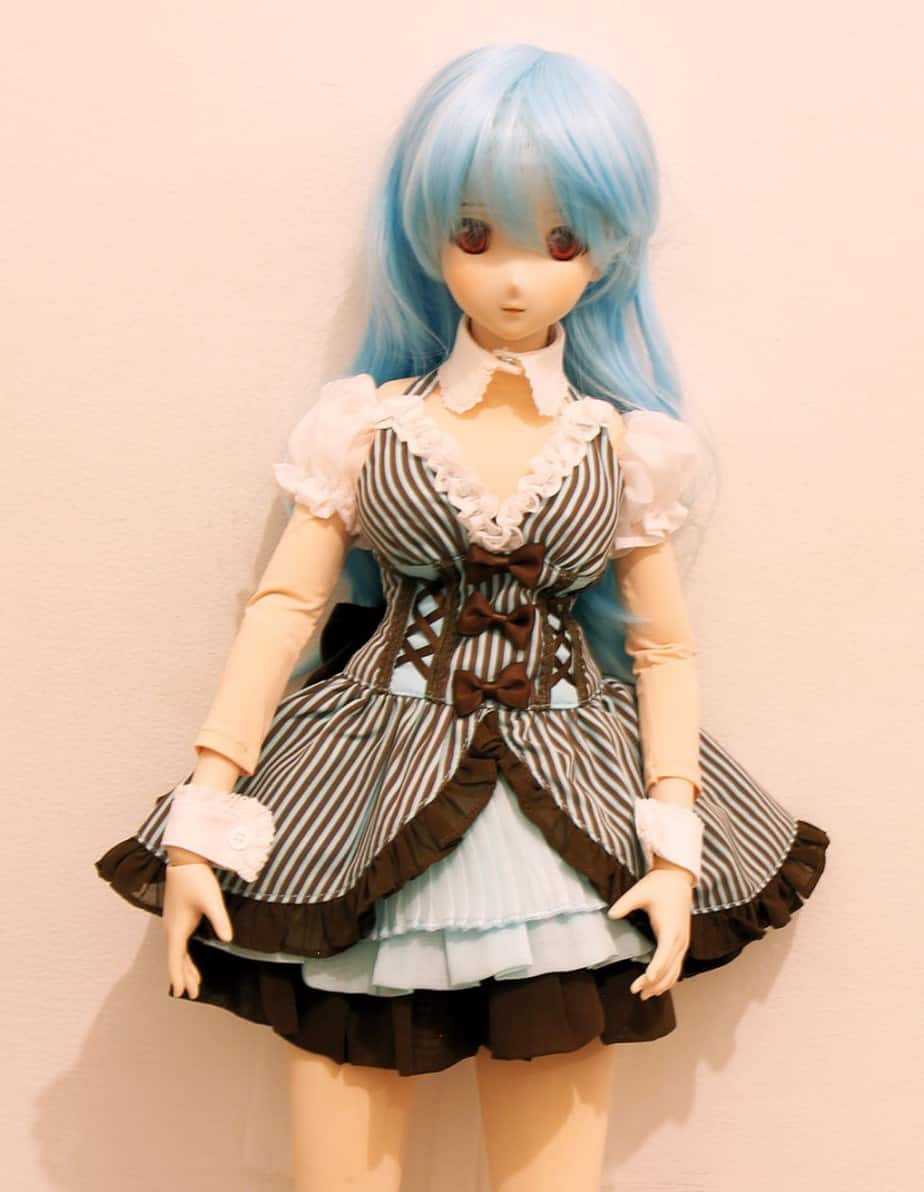
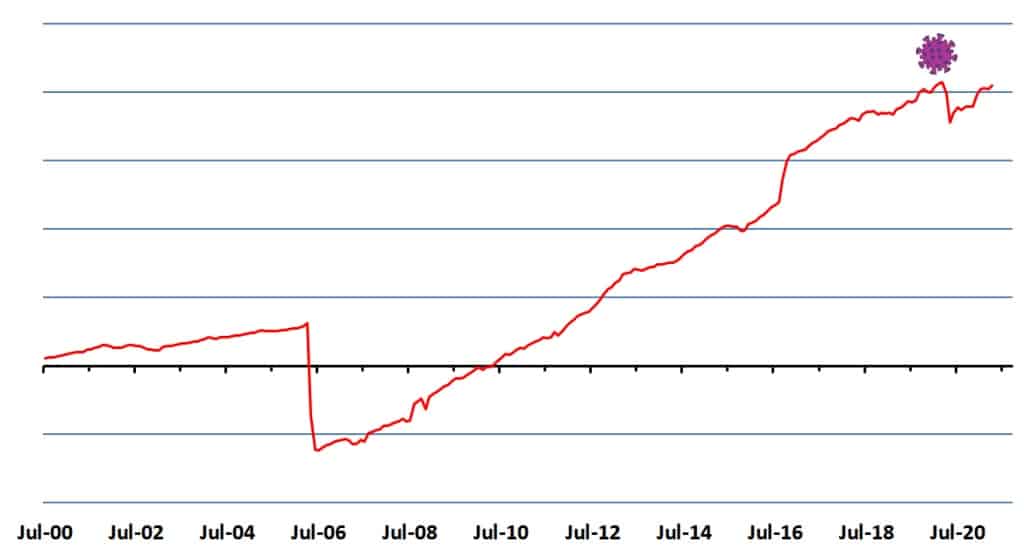
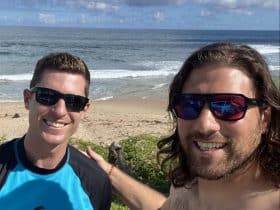
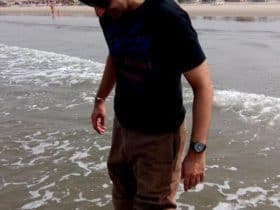
Leave a Reply
View Comments